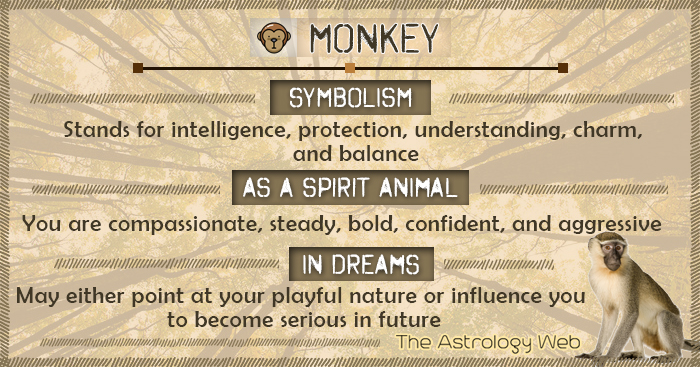Monkey Meaning and Symbolism
What Does a Monkey Symbolize
A monkey symbolizes intelligence, lightheadedness, seriousness, intensity, honor, involvement, grace, community, activity, family, protection, health, charm, curiosity, understanding, authority, observational clarity, energy, and untamed nature. Its playful nature predicts good luck and the way it swings its long tail embodies connection, mobility, balance, and control.
Having a Monkey as Your Spirit Animal (Totem Animal)
To have a monkey as your spirit animal means that you are compassionate, good-natured, steady, bold, confident and also aggressive.
Being social, it is natural for you to become the life of any party. You use your penchant for practical jokes to amuse all around you and consequently have a lot of friends. However, at times you get carried away and end up hurting others feelings. Also, you show a tendency to run away on facing problematic issues despite being an efficient problem solver.
Hooked on learning something new always, you seek to engage in creative and artistic pursuits, and nothing can faze you.
Just as a monkey becomes defensive and defiant when it is threatened by others, so too, you become rebellious when an occasion arises.
What Does it Mean When You Dream About Monkeys
Dreams about monkeys may either point at your playful nature or influence you to become more serious in future. They may also stand for deceit, intuition, and insight.
To see yourself being bitten by a monkey suggests the possibility of your falling for someone, who is not in your group.
Attacking a monkey signifies conflict with someone, whereas, chasing one stand for a manipulative person in your life.
Feeding a monkey implies that someone will betray you. A monkey climbing up a tree also holds the same meaning.
A dream of giving birth to a monkey embodies brotherly love, rapport, and satisfaction.
A dying monkey implies the resolution of an issue created by someone else.
Riding a monkey promises success in war.
Petting a monkey is a reflection of your weak enemies.
A dream of fighting a monkey and getting defeated is a reflection of your being affected by an incurable illness. Eating a monkey has the same suggestion.
A jumping monkey is representative of people around you, who are not very intelligent and may to hurt you.
A monkey in your house mirrors your suppressed self.
Dancing monkeys mark miseries in life, while friendly monkeys suggest pleasure and devoted friendship.
To see a monkey during pregnancy looks forward to one’s having an ugly baby.
An escaping monkey stands for a pleasant company.
Spiritual Meaning and Interpretation of Seeing Different Colored Monkeys in Dreams
White monkey: Symbolizes understanding and wisdom
Black monkey: Signifies luxury, tenderness, and friendship
Golden monkey: Stands for contentment and fidelity
Grey monkey: Embodies balance
Spiritual and Symbolic Meaning of Monkeys in Different Cultures and Religions
In Bible and Christianity
Here, monkeys stand for base instincts such as lust, greed, malice, and can even embody the devil.
In Chinese and Japanese Culture
The monkey is all powerful in ancient Chinese mythology. Moreover, representing versatility, activity, and movement in the Chinese zodiac, a monkey as a spirit animal endows its possessor with the qualities of agility, quick-wittedness, and fast thinking. Many traditional settings have images of a monkey as a talisman of protection. For instance, a monkey hanging a seal on top of a maple tree means that you would get promoted to a higher post. A monkey riding a horse also has the same meaning. In the 12-year cycle of the Chinese zodiac, the monkey is the 9th animal and stands for cleverness. Consequently, those taking birth in 1920, 1932, 1944, 1956, 1968, 1980, 1992, 2004, 2016, etc. are said to be born in the year of the monkey and are said to be blessed with intelligence.
Monkeys, representing secret messengers between gods and humans in the 8th century, were looked upon as protectors against demons and patrons of fertility, blessed marriages, and safe childbirth. Around the 13th century, they came to be seen as tricksters and in the 17th century, it was believed that they represented the negative side of humans. The Japanese macaque is also known as the snow monkey.
In African Culture
Regarded as social creatures, a monkey represents mischievousness, curiosity, comedy, and friendship here.
In Mexican Culture
A monkey, besides signifying tenderness and warmth, also stands for lust in Mexican mythology.
In Buddhism
In India, monkey lore was an essential part of Buddhism. The Jataka tales, the earliest collection of Buddhist folklore originating in the 3rd century BC in India and Sri Lanka, contain stories of how the historical Buddha lived many different lives in varied forms before achieving enlightenment. And, one such recurrent form is that of a monkey.
In Hinduism
Here, the god, Hanuman, believed to have the features of a monkey, is worshipped as a supreme protector and is said to be able to dispel all negativity with his enormous strength.
Connect with The Astrology Web
Get the latest Updates and tips delivered right to your inbox.
Get started

